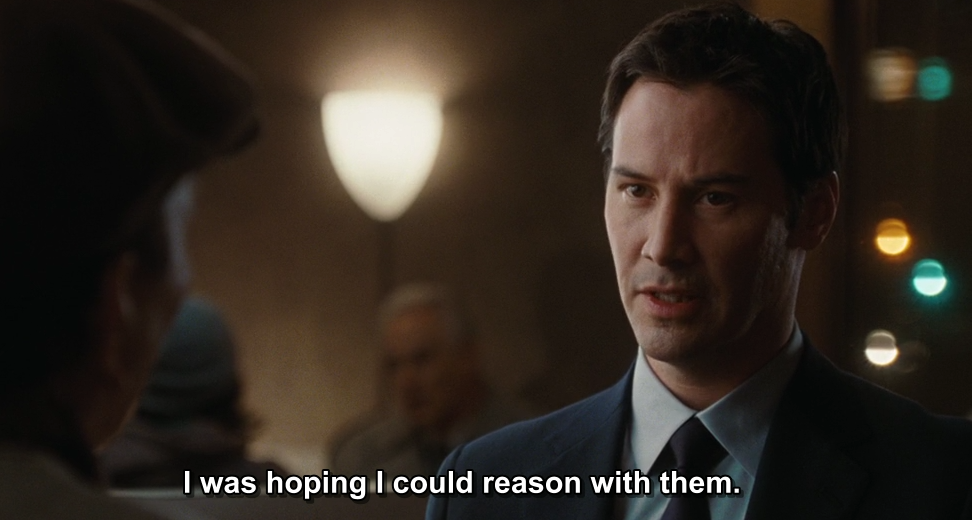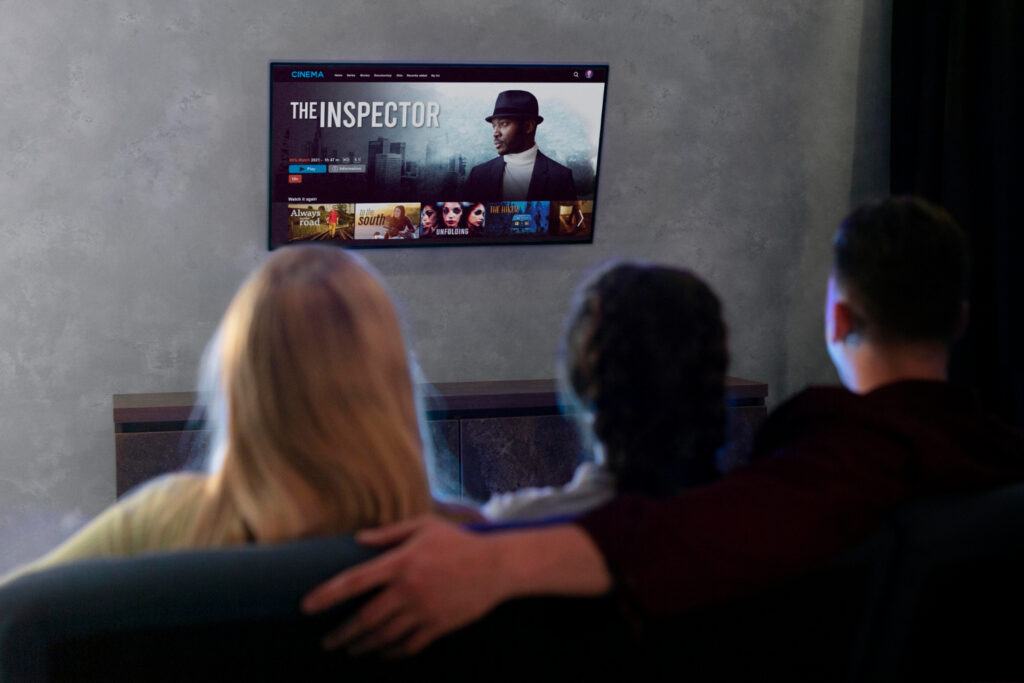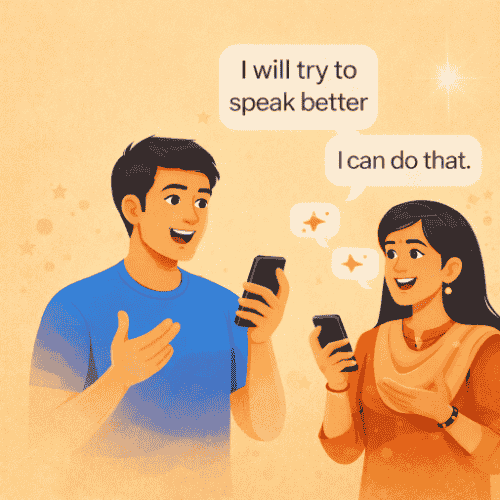If they want to improve their English, ESL students should watch English-language films. Most individuals like to watch a movie at their leisure to relax at the end of a long day or week. Then why not improve your command of the English language while you’re at it?
Movies to learn English are an excellent medium for learning English because they contextualize the language. Watching movies to learn English is a sure fire way to pick up new words you can use in everyday conversation because they are usually based on real-life events.

Why to Learn English with Movies?
Films are much more entertaining than textbooks when it comes to studying! Equally helpful is another possible use. Why watching an English-language film is a great way to boost your language skills:
- Real English: Listening to native speakers of the English language is the best way to learn the language, much more so than using a textbook to study grammar or new words. One approach to hearing native English speakers using the language authentically is to watch films made in the United Kingdom and the United States. By doing so, you can improve your command of contemporary English and approach the language with the fluency and confidence of a natural speaker.
- Better Pronunciation: The correct pronunciation of an English word is not always obvious. You can learn how to express things adequately by listening to native speakers in films. Examples of how word sounds vary in connected speech can also be seen in film dialogues.
- Live Context: It’s not always easy to retain the meaning or usage of a new word after you learn it. Words in films are more easily learnt and retained when placed inside the context of a tale.

How to learn English using This New Techniques
To get the most out of watching movies and learning English, there are specific steps you need to take to improve your English. Consider the following advice and strategies to make the most of your movie-watching experience.
Even though watching movies to learn English is a great way to relax, you should pay attention so you can understand what’s happening on screen and work on the pronunciation of the new words you hear.
Consider Viewing Films Without Subtitles in Your Native Language
- To begin, this is the trickiest method. When watching an English-language film, most students of the language like to have the option to use subtitles in their home language as a buffer.
- However, everyone knows that watching a video is next to impossible without reading the subtitles.
- You can expose yourself to the sounds of the English language by watching an English-language film with subtitles if you are a beginner.
- But once you’ve made some progress in studying English, you should push yourself to the point where you can understand English-language films without subtitles.
- Instead of using our brains to learn and comprehend a new language, we depend too much on subtitles when we watch TV.
- A second method that is unreliable for learning a language is translation. Mastering English expressions is preferable to trying to translate them into your tongue.
- See if you can enjoy an English-language film without subtitling it the next time you view it. How much you grasp could take you by surprise.
- Even if you’ve seen a movie in your native language with subtitles, you can view it again with English subtitles. Now that you know the storyline, this tip will ensure you don’t overlook any critical details.
Look for Films With English Subtitles
- Watching English-language films with English subtitles is a fantastic concept. With a thick accent, it becomes even more challenging to understand every word a movie character speaks.
- It’s best to watch a movie with English subtitles rather than just listen to the audio to get the most out of a movie. Subtitles in English will also help you learn and recognize new terms.
- Learning a language solely through listening to it can be challenging because you won’t have the handwriting skills to write down the words you hear.
- Since English is not a phonetic language, expanding your vocabulary and honing your writing abilities are two side effects of expanding your vocabulary through reading.

Sit Back and Enjoy Your Favorite Film
- As a general guideline, you should only watch movies to learn English you are interested in. Simply put, you won’t want to go into trouble understanding an English-language film if you aren’t interested in it.
- Do not squander your time and effort on a film genre that does not interest you; innumerable English-language films are available.
- Ensuring you enjoy yourself when watching English movies to learn English will help you learn the language more easily.
Repeat Phrases From the Film
- Stop the movie and repeat what you hear whenever an English word or phrase appears. You can watch the film once through and pause it anytime you find something interesting or learn something new.
- Slow and steady is the way to go while learning a new language. Always pay attention to the context when you hear an adjective to determine which preposition or word it is used with.
- Note any phrasal verbs you hear and study their usage throughout the film. Put these words into your own words and phrases.
- Use the context cues in the movie to ensure you completely grasp how to use the new language while practicing. Keep in mind that all meaning is generated from context.
Write Unknown Words in Notebook
- Adding new words and phrases to your vocabulary just by watching a movie is a considerable challenge. The average number of exposures needed to acquire a new term or phrase in a foreign language is seventeen.
- When you watch an English-language film, bring a notebook to jot down any new words or phrases that catch your eye.
- You can keep track of all the new terms you encounter in writing.
Avoid movies to learn English difficult dialogue.
- Although you should never say no to a good challenge, pushing yourself with demanding dialogue is not how to improve your English skills and self-assurance.
- The point of watching an English-language film is to improve my speaking skills. You should avoid movies to learn Englishthat make you feel bad about your English skills.
- Never forget that even natural English speakers occasionally stray from grammar standards. Learning the speech for usage in general English won’t help if it’s filled with regional slang and heavy accents.
✨ Remember: If you’re trying to boost your self-assurance, steer clear of movies to learn English with heavy phrasing. Prioritize movies to learn English that are within your linguistic skills, and be sure to set attainable goals for yourself.
Share the Experience with a Friend
- Why don’t you and your pals settle in for a movie night? After you’ve finished watching the film, this is a fantastic topic for a speech. You and your pals can start a movie club and enjoy watching films together.
- Also, feel free to pass along the key phrases and terms you found most significant and ask your friends for any that you may have forgotten.
- Speaking after listening is an excellent technique to determine what you have understood and where your knowledge is lacking.
- You should watch the film again and assess your level of comprehension.

Reasons to Learn English through Movie
a) It is real-life English
Instead of studying grammatical and academic English, you would like to learn English for everyday use. Grammar, vocabulary, and reading comprehension are all covered in the textbook. They are unable to instruct you in the art of spoken English. Grammar and vocabulary are the only things it can help you with. But it will slip your mind when you need it.
Wow, isn’t it incredible? Speak out if you’ve mastered the language. I dare you to speak for only a minute throughout your allotted time. Thus, use the methods above to listen, study, and use vocabulary.
b) It’s not the stuff of textbooks
You will learn the English spoken daily when you study it through movies to learn English TV shows. It is the way the native speakers talk. Their speech patterns, intonation, and facial expressions are all audible.
You can be sure that the expression of a word in your native tongue will differ from this one. This is the best way to get that local pronunciation that no textbook can teach you, and it will also help you listen and understand better.
c) Acquire vocabulary words
Think back to when we had schools! We used to study the list there to expand our English vocabulary. Using them in isolation won’t help you grasp their context, pronunciation, or meaning in a phrase.
Your desired language will be yours once you hear a native speaker use the same word. Students can better understand their use by seeing them applied in real-world contexts.
Using internet media that plays English videos is a great way to learn English speaking online. If you’ve studied the term “detective,” you can use it in context or as a prefix for people’s names. The application would vary. On occasion, it could be an adjective or noun. Find out where they’re put to use and get some hands-on experience with them.
d) Get the hang of the language
According to popular belief, words barely account for seven percent of everyday conversation. So, how exactly are the other 93% conveyed?
Just look at the answer. Language is one of many tools at your disposal; others include body language, facial emotions (such as grins or frowns), vocal tones (such as laughing or sobbing), and more. There you have it. The best way to learn this is to watch movies and TV shows to learn English.
e) It provides valuable cultural viewpoints
Movies to help you learn English are a great way to gain a glimpse into the culture of a particular region or people. Conversely, you will learn about the era in which the occurrence occurred. There, you might also get some socioeconomic information.
You will be better able to communicate with other members of society if you study their language and culture. Corporate culture can be taught through cinema.

Best movies to learn English
The first step is to watch English movies, and the second step is to pay attention. Many wonder how I can learn or improve my English by watching films.
The solution is straightforward. They can assist you in many ways: listening to native speakers of the language can help you pick up on subtle nuances, improve your sentence-formation skills, increase your vocabulary, learn the grammar rules, perfect your pronunciation, decipher idioms, phrases, and colloquial expressions, learning different communication methods, and recognizing the significance of non-verbal cues. If you want to use films to improve your English, watch as many as you can take what you’ve learned, and use it in your spoken English.
1. Forrest Gump
Forrest Gump, starring Tom Hanks, is about a man with a low IQ who has had a fantastic life. Forrest narrates the entire film in a slow, easy-to-understand “Southern Drawl” (accent from the South of the US), ideal for those just starting with the English language.
???? Did You Know: Eddie Redmayne’s acting in The Theory of Everything was so good that Stephen Hawking said it sometimes felt like he was watching himself on screen!
2. When Harry met Sally
The friendship between two friends and their development are the subject of the timeless American romantic comedy When Harry Met Sally. Catchphrases (popular expressions) from the film 1989 have become famous in contemporary American society, even though the plot may seem a bit dated now. The film opens with a drawn-out discussion between the two protagonists on a long car ride, giving you plenty of opportunity to hone your listening comprehension abilities.
3. Four Weddings and a Funeral
Feeling undecided about a US or UK accent? The perfect blend is yours in Four Weddings and a Funeral. Hugh Grant stars as a socially inept British wedding guest who develops feelings for stunning American actress Andie McDowell in a timeless picture that spans four weddings (and a burial). You may compare the two dialects and discover the best British slang from this charming film, Four Weddings.
???? Did You Know: One of the reasons Submarine was such a popular hit in the UK is that Alex Turner wrote the soundtrack of the famous Sheffield band Arctic Monkeys. It’s well worth a listen!
4. Little Women
With its easy-to-understand dialogue and endearing plot, Little Women—one of the biggest hits 2019—is an excellent film for language learners. Fans of American history will like this picture, which follows four sisters as they endure life amid the Civil War. After seeing the movie, you might want to pick up the book that inspired it!
5. Great Gatsby
Baz Luhrmann’s Great Gatsby is an excellent choice for ESL students interested in the Roaring Twenties because it is a contemporary take on the famous American novel. Any student of the English language will find this film engaging due to its gloomy tone and superb score.
6. The Social Network
It is pretty fascinating to learn about the history of Facebook! An excellent resource for expanding one’s vocabulary in law and technology, this fascinating film follows Mark Zuckerberg as he goes from college student to entrepreneur.
7. Juno
Juno is an excellent choice for students who would rather see indie films than large Hollywood hits because it is funny, charming, and easy to understand. For those who teach conversation classes, this film is a terrific jumping off place. Discuss the show as a group and see if anyone can put themselves in Juno’s shoes.
8. The Imitation Game
Learners get the opportunity to uncover a previously unreported story in British history through the poignant narrative of an English military hero who was persecuted due to his sexuality. The film’s dialogue and spoken word are a model of “Queen’s English,” with crystal clear pronunciation.
9. Frozen
Frozen, a lovely and incredibly accessible Disney film about a girl’s quest to find her sister, has become a massive hit with audiences worldwide. Even though it’s a kiddie flick, watching them is a great way to ease into learning English if you’re just starting. Kids’ films are perfect for introducing audiences to the English language because of the straightforward plots and memorable soundtracks.
10. The King’s Speech
I love the idea of watching a film about a British historical figure learning English to improve my language skills. The film emphasizes correct pronunciation since King George VI has trouble speaking because of speech impairment.

How to Talk About movies to learn English in English
Talking about movies to learn English in English can be confusing. For one thing, there are different words for every type of movie! Here are some of the genres of films in English:
| Film genre | What it means | Examples |
| Rom-com | ‘Romantic comedy’ | There’s Something About Mary, Just Go With It |
| ‘Whodunnit’ | Short for ‘who has done it?’ These films are about a crime, and the audience has to try to guess who did the crime | Sherlock Holmes, Agatha Christie |
| Sci-fi | ‘Science fiction’ – films about robots, aliens or the future | Star Wars, Star Trek |
| Horror | Scary movies | Dracula, Frankenstein, It |
| Action | Films with lots of action – about heroes, guns and adventure | Die Hard, Taken, The Dark Knight |
| Comedy | movies to learn English try to make you laugh | Anchorman, Airplane!, Hot Fuzz |
| Documentary | Films that investigate something in real life | The March of the Penguins, Grizzly Man |
| Mockumentary | A mock or joke documentary. This is like a documentary, but it is about something that does not exist. | Spinal Tap, Borat |
| Animation | Cartoon films | Toy Story, The Lion King |
Challenge Yourself with These Best movies to learn English
Hollywood blockbusters are great practice for anyone who wants to improve their English to a higher level. In addition to providing entertainment, watching these English-language films can introduce you to sophisticated language and ideas that will help you become a more fluent speaker.
| Movies | Description |
| Inception (2010) | Christopher Nolan’s mind-bending masterwork, complex plot, and philosophical ideas will test your understanding skills. |
| The Shawshank Redemption (1994) | A powerful drama that explores friendship, hope, and redemption, this film offers a rich vocabulary and heartfelt performances. |
| The Great Gatsby (2013) | Based on F. Scott Fitzgerald’s classic novel, this visually stunning movie immerses you in the opulent world of the Roaring Twenties while exposing you to sophisticated language. |
| Pulp Fiction (1994) | Quentin Tarantino’s cult classic features sharp and witty dialogue that showcases a variety of American accents and slang. |
| Interstellar (2014) | Featuring a variety of regional dialects, this science fiction epic will test your understanding of scientific ideas while also transporting you emotionally through its storytelling. |
Using Movies to learn English as Language Learning Resources
In addition to being entertaining, films can be valuable resources for improving one’s command of the English language. movies to learn English are a great way to learn a new language since they allow you to practice listening comprehension, increase your vocabulary, and grasp the language in its native context.
Some pointers for making the most of English-language films for language learning:
Start with films with subtitles or captions in your mother tongue: You won’t have any trouble keeping up with the plot or the conversation if you do this.
If you want to increase your listening comprehension and catch subtleties that you might have missed on the first viewing, watch films many times.
While you watch, jot down new terms and expressions. If you want to remember any of the new words or phrases you read, keep a notepad close by. Your vocabulary and command of the language will both benefit from this.
Additional resources for learning: You can find online English coaching sessions on several websites that give personalised instruction to help you master the language. To peruse their wares, you can go to their website.
Conclusion
As we have shown, films are not only entertaining but also highly effective means of improving one’s command of the English language. If you want to improve your English language skills, this post will show you the top films to watch. We have covered material suitable for students of all skill levels.
Movies to learn English are a great way to learn a new language because they allow you to practice listening, increase your vocabulary, comprehend other cultures, and have fun. Every film offers a different chance to fully immerse yourself in English, whether it has primary language or sophisticated discussions.
To test your new language skills, we suggest watching some of the films listed in this article. Repetition is also crucial. You can improve your listening comprehension by watching movies to learn English more than once and making notes of new expressions and vocabulary words as you go.
???? To Read More Blogs: Click Here
Frequently Asked Questions
How can watching movies help improve English skills?
Movies provide real-life context, exposing viewers to authentic language, various accents, and idiomatic expressions. By watching films, learners can enhance their vocabulary, listening comprehension, and understanding of everyday conversations, while also picking up on cultural nuances.
Should I use subtitles when watching movies to learn English?
Yes, subtitles can be very helpful, especially for beginners. Start by using subtitles in your native language to understand the plot, then switch to English subtitles to focus on vocabulary and sentence structure. Advanced learners can watch without subtitles to improve listening skills and fluency.
What types of movies are best for learning English?
Movies with clear dialogue, everyday vocabulary, and moderate pacing are ideal. Romantic comedies, family dramas, and animated films are often great choices. Avoid genres with heavy slang or complex technical language unless you're ready for more advanced material.
How often should I watch movies to see improvement in my English?
Consistency is key. Watching one to two movies per week can lead to significant improvement in listening comprehension and vocabulary over time. Re-watching the same movie multiple times can also deepen understanding and reinforce new language skills.

